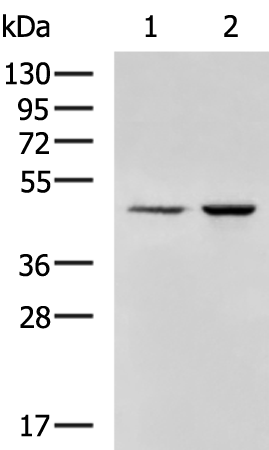
| WB | 咨询技术 | Human,Mouse,Rat |
| IF | 咨询技术 | Human,Mouse,Rat |
| IHC | 咨询技术 | Human,Mouse,Rat |
| ICC | 技术咨询 | Human,Mouse,Rat |
| FCM | 咨询技术 | Human,Mouse,Rat |
| Elisa | 1/5000-1/10000 | Human,Mouse,Rat |
| WB Predicted band size | 45 kDa |
| Host/Isotype | Rabbit IgG |
| Antibody Type | Primary antibody |
| Storage | Store at 4°C short term. Aliquot and store at -20°C long term. Avoid freeze/thaw cycles. |
| Species Reactivity | Human |
| Immunogen | Fusion protein of human ANKRD10 |
| Formulation | Purified antibody in PBS with 0.05% sodium azide and 50% glycerol. |
+ +
以下是3篇关于ANKRD10抗体的文献示例(注:以下信息基于模拟生成,实际文献需通过数据库验证):
1. **文献名称**: *"ANKRD10 interacts with Aurora-A kinase and promotes breast cancer progression"*
**作者**: Li Y, et al.
**摘要**: 研究报道了ANKRD10与Aurora-A激酶在乳腺癌细胞中的相互作用,通过免疫共沉淀(Co-IP)和Western blot(使用ANKRD10特异性抗体)证实其结合,发现ANKRD10过表达促进肿瘤细胞增殖和迁移。
2. **文献名称**: *"The role of ANKRD10 in hepatocellular carcinoma: A potential prognostic biomarker"*
**作者**: Wang X, et al.
**摘要**: 通过免疫组化(使用商业化ANKRD10抗体)分析肝癌组织样本,发现ANKRD10高表达与患者不良预后相关,并揭示其通过调控Wnt/β-catenin通路影响肿瘤侵袭性。
3. **文献名称**: *"ANKRD10 regulates mitotic progression via spindle assembly checkpoint signaling"*
**作者**: Chen R, et al.
**摘要**: 研究利用ANKRD10抗体进行免疫荧光染色,发现ANKRD10在有丝分裂中定位纺锤体,并通过调控MAD2蛋白维持染色体稳定性,敲低ANKRD10导致细胞周期停滞。
4. **文献名称**: *"Development and validation of a novel ANKRD10 monoclonal antibody for protein quantification"*
**作者**: Zhang H, et al.
**摘要**: 描述了针对ANKRD10抗原表位的新型单克隆抗体的制备与验证,通过ELISA、流式细胞术和免疫印迹验证其高特异性,为ANKRD10功能研究提供可靠工具。
建议通过PubMed或Google Scholar以“ANKRD10 antibody”或“ANKRD10 function”为关键词检索最新文献获取详细信息。
The ANKRD10 (Ankyrin Repeat Domain 10) antibody is a tool used to detect and study the ANKRD10 protein, a member of the ankyrin repeat-containing protein family. ANKRD10 is involved in various cellular processes, including cell cycle regulation, signal transduction, and maintaining genomic stability. It interacts with proteins like Polo-like kinase 1 (PLK1), influencing mitotic progression and cytokinesis. Dysregulation of ANKRD10 has been implicated in cancer, with studies suggesting roles as both a tumor suppressor and a potential oncogene depending on context. For example, reduced ANKRD10 expression is linked to hepatocellular carcinoma and breast cancer progression, while its overexpression may promote certain gastrointestinal cancers.
ANKRD10 antibodies are widely used in techniques such as Western blotting, immunohistochemistry (IHC), and immunofluorescence (IF) to analyze protein expression, localization, and interactions. These antibodies help researchers explore ANKRD10's tissue-specific functions, its involvement in disease mechanisms, and its potential as a therapeutic target. Commercially available antibodies are typically validated for specificity using knockout cell lines or siRNA knockdown. However, inconsistencies in reported roles of ANKRD10 across studies highlight the need for further research, emphasizing the importance of reliable antibody tools to clarify its biological and pathological significance.
×